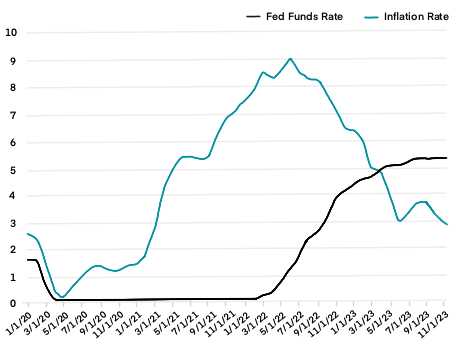CHICAGO — An analysis from Origin Investments (Origin) predicts a tumultuous 2024, with concerns of a recession and elevated interest rates likely to continue. Despite this, the Chicago-based real estate fund manager expects next year to bring unique opportunities for multifamily investors to secure protected positions in the capital structure and enhance investment returns.
“The volume of variable-rate bank loans — made when the Secured Overnight Financing Rate was 0 percent and the 10-year Treasury note yield was below two percent — coming due in 2024 will create a generational opportunity in senior debt and preferred equity investments,” explains David Scherer, co-CEO of Origin. “Despite uncertainties, it remains a mistake to stay out of the multifamily investment market in 2024.”
Origin predicts that rent growth will stabilize to historic norms in 2024. The analysis theorizes that the negative rent growth some markets — such as Austin, Texas — experienced in 2023 was likely due to oversupply, and will reverse by January 2025.
The report also indicates that long-term demand and absorption of apartments and rental homes is likely to remain strong for several years, as the U.S. is facing a shortage of between 5.5 million and 6.8 million housing units. Additionally, the price discrepancy between buying and renting a home is approximately $1,000 per month, according to the report.
“It’s a really tough time to buy a home and it’s a real conundrum,” Scherer says. “Many people want to buy. However, with inventories low, mortgage rates at or above 8 percent and current homeowners unwilling to trade in their 4 percent mortgages, there is a supply drought and prices remain high. That’s bad for potential homebuyers, but good for multifamily investors.” (After peaking at nearly 8 percent in late October, the average 30-year mortgage rate has been on a downward slide to 6.9 percent as of Thursday, Dec. 14, according to Freddie Mac.)
On the other hand, the analysis also reports that new multifamily development is likely to slow substantially in 2024, despite high demand. This is due to commercial real estate lending slowing to historic lows, as well as a potential rise in defaults on expiring debt. Origin predicts a 12-to-18-month period before new construction gains significant momentum again.
Additionally, the report states that investment capital is likely to go to the largest providers, similar to the periods during and following the Great Recession. According to Origin, this will trigger consolidations among developers, general partners and sponsors, private equity managers and property managers, shrinking the real estate investment industry.
“When things get crazy, investors seek out bigger names with solid reputations and proven track records,” Scherer concludes. “It’s all about the balance sheet.”
Origin’s predictions are based on data from Multilytics, the company’s proprietary suite of machine-learning models. According to the Origin Investments website, Multilytics was created to generate accurate and consistent rent growth projections for the company’s target markets. The models give Origin professionals insights into local properties and land sites.
Click here to read the full analysis from Origin.

